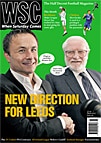 The other United are doing well on the pitch despite the Glazers’ takeover and media interest in FC United is waning. The breakaway club are having a rougher ride this season, as Ashley Shaw reports
The other United are doing well on the pitch despite the Glazers’ takeover and media interest in FC United is waning. The breakaway club are having a rougher ride this season, as Ashley Shaw reports
It began so well. FC United’s first season was accompanied by such sympathetic media coverage that even rival fans supported the brave stand made by those prepared to give up the glamour of the Premiership for life in football’s basement.
In An Undividable Glow, author Rob Brady paints a somewhat romantic picture of the struggles FCUM fans faced in the summer of 2005. The individual decision to switch clubs was a fraught one and Brady, a veteran home-and-away supporter of Manchester United, encapsulates the heartache that followed. Brady’s belief that clubs are in the blood, that the name of your team should be stamped on your birth certificate, only emphasised the difficulty of his decision to give up MUFC. Yet throughout, Brady maintains the “two clubs, one soul” philosophy at the heart of the new club.
FCUM’s first season was an eye-opener for both disaffected fans who joined the tour of the North West Counties League Division Two and their opponents, many of whom normally played before crowds nudging 50. The arrival of, on average, 1,200 away supporters brought out the best and worst in clubs. Some sought to capitalise by charging (by NWCL 2 standards) extortionate admission prices, while others complained of rowdy behaviour and threatened to have the club thrown out of the league. Yet in the main the behaviour of fans was better than expected and other clubs enjoyed a bumper payday. The newcomers’ support base grew steadily, peaking with an attendance of 6,023 for the title celebrations at Gigg Lane in April. Thus by the end of An Undividable Glow, far from missing big United, Brady has his sights firmly focused on building up FCUM into the community club that most fans wished MUFC had become.
Yet this season these same good intentions appear to have caused friction with certain elements within MUFC’s support. As a consequence the fans of the two clubs appear to have drifted further apart, the schism made all the worse by United’s improved form, which has glossed over the long-term implications of the Floridian takeover. A sticker campaign that took the slogan “Love United, Hate Glazer” as a catchphrase of solidarity with FC has since been hijacked by new stickers featuring the slogan “Love United, Hate FC”, while a tempestuous derby against Salford City in November provided an opportunity for United “loyalists” to parade a banner calling FC supporters “Judas Scum”.
While this does sound a bit Life of Brian, there are serious issues to be addressed. There have been incidents at certain away games where known hooligans in places such as Stoke have attended FC matches because United are in town. Meanwhile, FC’s board have had to deal with self-styled “Red Army General” and hooligan author Tony O’Neill, who showed up at Gigg Lane for a game but was prevented from entering the ground by his police minders.
These incidents are probably blown out of proportion but it would seem logical that, because of their large following, FC are likely to attract trouble at games where the police presence was previously negligible. A recent example came with the fixture against the non-League club Manchester City supporters formed in 1955, Maine Road. The game was switched from Maine Road’s usual home venue in Chorlton to Stalybridge and many predicted trouble at the “mini-derby”. Fortunately the fixture passed with little off-pitch incident, although the game itself, featuring a late FC winner, whetted the appetite of many for non-League football.
Yet with attendances down by 20 per cent (or an average of 500 per match) from last season and the well of sympathy so evident in the first season drying up as media interest has switched elsewhere, together with the potential hooligan problems mentioned above, it’s clear FCUM are finding life tougher one-and-a-half seasons on.
Sir Alex Ferguson’s criticism hasn’t helped in this respect, either; in fact it might have had rather more impact than at first imagined. Fan groups criticised Ferguson when he said of the anti-Glazer protesters: “They carried on to the degree where they actually thought they should have a say in the running of the football club.” Ferguson’s statement was blatantly contrary to his earlier support of the anti-Glazer coalition.
Yet perhaps the manager understands the rank-and-file supporters better than some assume. By initially opposing the Glazers and later accepting them, Ferguson has acted like the vast majority of Manchester United supporters and his words seem to have persuaded many in the Old Trafford stands. With United riding high and attendance records being broken on a fortnightly basis, life for FC is likely to get harder before it gets easier.
An Undividable Glow by Robert Brady is available from fcunitedbook.co.uk
From WSC 241 March 2007. What was happening this month